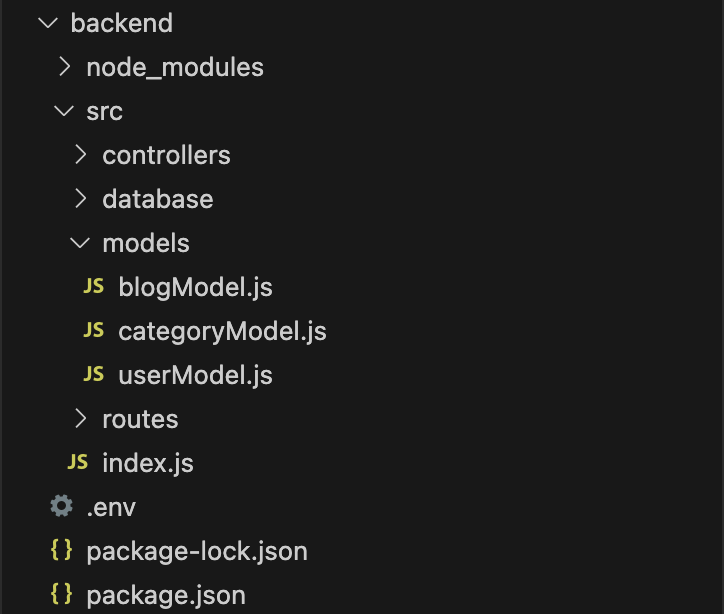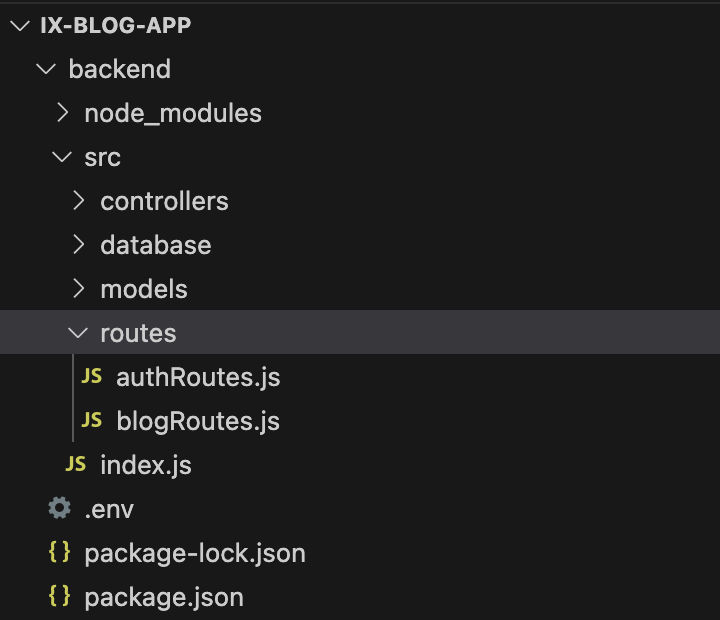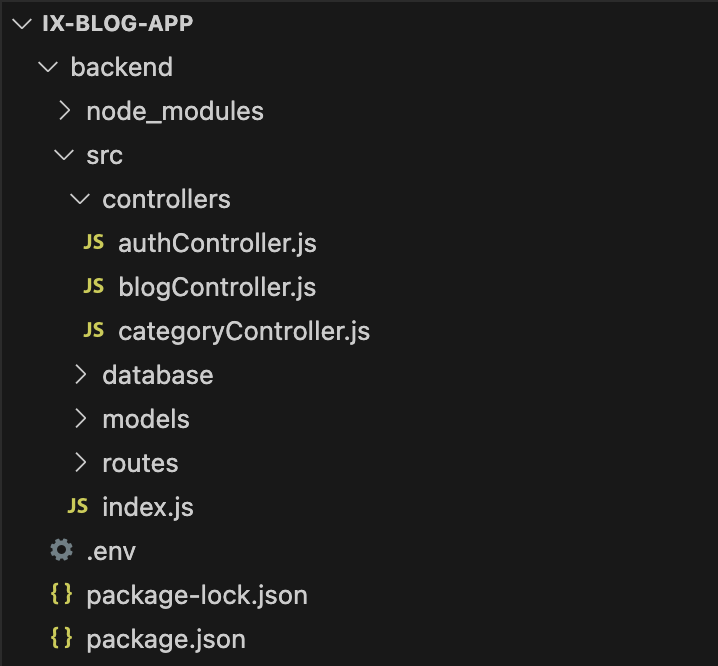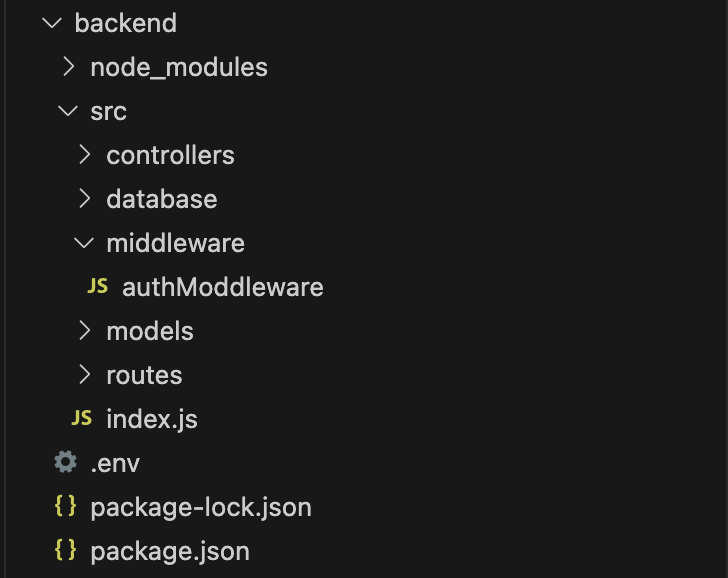# JWT Authentication
# Getting started
# Structure of a JWT
# Example Encoded JWT:
eyJhbGciOiJIUzI1NiIsInR5cCI6IkpXVCJ9.
eyJzdWIiOiIxMjM0NTY3ODkwIiwibmFtZSI6IkpvaG4gRG9lIiwiaWF0IjoxNTE2MjM5MDIyfQ.
SflKxwRJSMeKKF2QT4fwpMeJf36POk6yJV_adQssw5c
# Decoded JWT Token:
Header:
{
"alg": "HS256",
"typ": "JWT"
}
Payload:
{
"sub": "1234567890",
"name": "John Doe",
"admin": true
}
Signature:
HMACSHA256(
base64UrlEncode(header) + "." + base64UrlEncode(payload),
secret)
# User model
# Create user model
In backend/src/models create a file called userModel.js

# Define user model
src/models/userModel.js
const mongoose = require("mongoose");
const userSchema = new mongoose.Schema(
{
firstName: {
type: String,
required: [true, "First name is required"],
},
lastName: {
type: String,
required: [true, "Last name is required"],
},
email: {
type: String,
required: [true, "Email is required"],
unique: [true, "Email is already registered"],
},
bio: {
type: String,
equired: [true, "Email is required"],
},
image: {
type: String,
default: "https://storage.googleapis.com/ix-blog-app/download.png",
},
password: {
type: String,
required: [true, "Password is required"],
},
},
{
timestamps: true,
}
);
module.exports = mongoose.model("User", userSchema);
# Update blog model
src/models/blogModel.js
const mongoose = require("mongoose");
const blogSchema = new mongoose.Schema(
{
authorId: {
type: mongoose.Schema.Types.ObjectId,
required: true,
ref: "User",
},
categoryId: {
type: mongoose.Schema.Types.ObjectId,
required: true,
ref: "Category",
},
title: {
type: String,
required: true,
},
description: {
type: String,
required: true,
},
image: {
type: String,
required: true,
},
content: {
type: Array,
required: true,
},
},
{ timeStamp: true }
);
// Add a toJSON method to the schema to control the output of blog instances
blogSchema.method("toJSON", function () {
const {
__v,
_id,
categoryIds,
authorId: author,
...object
} = this.toObject();
object.id = _id;
// Add category details to the blog object
object.categories = categoryIds.map((category) => {
return {
id: category._id,
title: category.title,
description: category.description,
color: category.color,
};
});
// Add author details to the blog object
if (authorId && authorId._id) {
object.author = {
id: author._id,
firstName: author.firstName,
lastName: author.lastName,
email: author.email,
image: author.image,
bio: author.bio,
}
}
return object;
});
module.exports = mongoose.model("Blog", blogSchema);
# Auth Routes
# Create auth routes
In backend/src/routes create a file called authRoutes.js

# Define auth routes
src/routes/authRoutes.js
const express = require("express");
const router = express.Router();
const { login, register } = require("../controllers/auth");
router.post("/login", (req, res) => {
login(req, res);
});
router.post("/register", (req, res) => {
register(req, res);
});
module.exports = router;
# Update index.js
src/index.js
const express = require("express");
const cors = require("cors");
require("dotenv").config();
const blogsRoutes = require("./routes/blogs");
const categoryRoutes = require("./routes/categories");
const authRoutes = require("./routes/auth");
const connectDB = require("./database/db");
connectDB();
const port = process.env.PORT || 8000;
const app = express();
app.use(cors());
app.use(express.json());
app.use("/api/blogs", blogsRoutes);
app.use("/api/categories", categoryRoutes);
app.use("/api/auth", authRoutes);
app.listen(port, () => {
console.log(`Example app listening on port ${port}`);
});
# Auth Controller
# Create auth controller
In backend/src/contollers create a file called auth.js

# Define auth controller
src/controllers/auth.js
login register
const User = require("../models/User");
const register = async (req, res) => {
try {
const { firstName, lastName, email, bio, password } = req.body;
//check payload
if (!firstName || !lastName || !email || !bio || !password) {
res.status(400).json({ message: "All fields are required", data: [] });
return;
}
// check if email already exists
const userExists = await User.findOne({ email });
if (userExists) {
res.status(400).json({ message: "User already exists", data: [] });
return;
}
// create new user
const user = new User({
firstName,
lastName,
email,
bio,
password,
});
const newUser = await user.save();
let resUser = newUser.toJSON();
delete resUser.password;
res.status(201).json({ message: "New user created!", data: resUser });
} catch (error) {
res.status(500).json({ message: error.message, data: [] });
}
};
login funtion
const login = async (req, res) => {
try {
const { email, password } = req.body;
// check payload
if (!email || !password) {
res.status(400).json({ message: "All fields are required", data: [] });
return;
}
// check if user exists
const user = await User.findOne({ email });
if (!user) {
res.status(400).json({ message: "User does not exist", data: [] });
return;
}
// check if password is correct
if (user.password !== password) {
res.status(400).json({ message: "Invalid credentials", data: [] });
return;
}
let resUser = user.toJSON();
delete resUser.password;
res.status(200).json({ message: "Login successful!", data: user });
} catch (error) {
res.status(500).json({ message: error.message, data: [] });
}
};
module.exports = {
register,
login,
};
# Install bcrypt
npm i bcryptjs
# Update auth controller
register function
const bcrypt = require("bcryptjs");
const register = async (req, res) => {
try {
const { firstName, lastName, email, bio, password } = req.body;
//check payload
if (!firstName || !lastName || !email || !bio || !password) {
res.status(400).json({ message: "All fields are required", data: [] });
return;
}
// check if email already exists
const userExists = await User.findOne({ email });
if (userExists) {
res.status(400).json({ message: "User already exists", data: [] });
return;
}
// hash password
const salt = await bcrypt.genSalt(10);
const hashedPassword = await bcrypt.hash(password, salt);
// create new user
const user = new User({
firstName,
lastName,
email,
bio,
password: hashedPassword,
});
const newUser = await user.save();
let resUser = newUser.toJSON();
delete resUser.password;
res.status(201).json({ message: "New user created!", data: resUser });
} catch (error) {
res.status(500).json({ message: error.message, data: [] });
}
};
login funtion
const login = async (req, res) => {
try {
const { email, password } = req.body;
// check payload
if (!email || !password) {
res.status(400).json({ message: "All fields are required", data: [] });
return;
}
// check if user exists
const user = await User.findOne({ email });
if (!user) {
res.status(400).json({ message: "User does not exist", data: [] });
return;
}
// check hashed password
const validPassword = await bcrypt.compare(password, user.password);
if (!validPassword) {
res.status(400).json({ message: "Invalid credentials", data: [] });
return;
}
let resUser = user.toJSON();
delete resUser.password;
res.status(200).json({ message: "Login successful!", data: resUser });
} catch (error) {
res.status(500).json({ message: error.message, data: [] });
}
};
# Install jsonwebtoken
npm i jsonwebtoken
# Update .env
.env
PORT=8000
MONGO_URI=mongodb://localhost:27017/blog_app
JWT_SECRET=123abc
# Define generate token function
src/controllers.auth.js
const jwt = require("jsonwebtoken");
.
.
.
const generateToken = (id) => {
return jwt.sign({ id }, process.env.JWT_SECRET, {
// expiresIn: "1d",
});
};
# Update auth controller (Cont.)
register function
const register = async (req, res) => {
try {
const { firstName, lastName, email, bio, password } = req.body;
//check payload
if (!firstName || !lastName || !email || !bio || !password) {
res.status(400).json({ message: "All fields are required", data: [] });
return;
}
// check if email already exists
const userExists = await User.findOne({ email });
if (userExists) {
res.status(400).json({ message: "User already exists", data: [] });
return;
}
// hash password
const salt = await bcrypt.genSalt(10);
const hashedPassword = await bcrypt.hash(password, salt);
// create new user
const user = new User({
firstName,
lastName,
email,
bio,
password: hashedPassword,
});
const newUser = await user.save();
let resUser = newUser.toJSON();
resUser.token = generateToken(resUser._id);
delete resUser.password;
res.status(201).json({ message: "New user created!", data: resUser });
} catch (error) {
res.status(500).json({ message: error.message, data: [] });
}
};
login funtion
const login = async (req, res) => {
try {
const { email, password } = req.body;
// check payload
if (!email || !password) {
res.status(400).json({ message: "All fields are required", data: [] });
return;
}
// check if user exists
const user = await User.findOne({ email });
if (!user) {
res.status(400).json({ message: "User does not exist", data: [] });
return;
}
// check hashed password
const validPassword = await bcrypt.compare(password, user.password);
if (!validPassword) {
res.status(400).json({ message: "Invalid credentials", data: [] });
return;
}
let resUser = user.toJSON();
resUser.token = generateToken(resUser._id);
delete resUser.password;
res.status(200).json({ message: "Login successful!", data: resUser });
} catch (error) {
res.status(500).json({ message: error.message, data: [] });
}
};
# Auth Middleware
# Create Auth Middleware
In backend/src/middleware create a file called authMiddleware.js

# Define auth Middleware
src/middleware/authMiddleware.js
const jwt = require("jsonwebtoken");
const User = require("../models/User");
const protect = async (req, res, next) => {
let token;
if (
req.headers.authorization &&
req.headers.authorization.startsWith("Bearer")
) {
token = req.headers.authorization.split(" ")[1];
}
if (!token) {
return res
.status(401)
.json({ message: "Not authorized to access this route" });
}
try {
const decoded = jwt.verify(token, process.env.JWT_SECRET);
const user = await User.findById(decoded.id);
if (!user) {
return res.status(404).json({ message: "No user found with this id" });
}
req.user = user;
next();
} catch (error) {
return res
.status(401)
.json({ message: "Not authorized to access this route" });
}
};
module.exports = { protect };
# Protect Routes
# Update blog routes
src/routes/blogsRoutes.js
const express = require("express");
const router = express.Router();
const blogController = require("../controllers/blogs");
const { protect } = require("../middleware/authMiddleware");
router.post("/", protect, (req, res) => {
createBlog(req, res);
});
router.get("/", (req, res) => {
getBlogs(req, res);
});
router.get("/:id", (req, res) => {
getBlog(req, res);
});
router.put("/:id", protect, (req, res) => {
updateBlog(req, res);
});
router.delete("/:id", protect, (req, res) => {
deleteBlog(req, res);
});
module.exports = router;